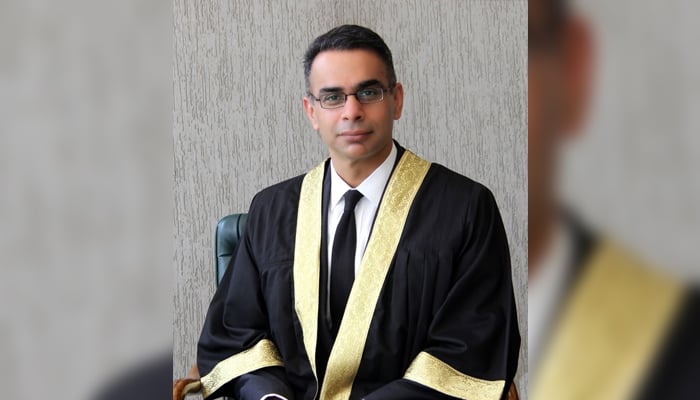Prolonged stay orders show inefficiency of judicial system: IHC judge
He said claim of trillions of rupees stuck in the taxes and other fiscal cases before courts might not reflect the true picture
ISLAMABAD: Justice Babar Sattar of Islamabad High Court (IHC) said Saturday stay orders for longer periods showed inefficiency of judicial system, resulting in increased pendency of cases of taxes and other fiscal-related issues
He was addressing a session on Justice for All under Econ Fest. The session was organised by the Pakistan Institute of Development Economics (PIDE) in collaboration with 33 other partners here at the Pak-China Centre.
He said claim of trillions of rupees stuck in the taxes and other fiscal cases before courts might not reflect the true picture. He hinted at frivolous cases filed by the different public sector departments against each other or against the regulators that also resulted in increased pendency of superior courts.
He emphasised the need for effective placement of Court Management System and Case Management System that should be used for speedy disposal of the pending cases.
On the occasion, IMF’s former official Masood Ahmed said there were 30 countries, including Pakistan, where the debt burden mounted a lot. Only four countries approached for debt restructuring of their outstanding foreign loans, he said. However, he opposed it and argued the debt restructuring was not done by multilateral creditors, while it took more than two years during which several macroeconomic indicators and situations changed a lot.
Justice Babar Sattar said there were certain issues that could only be resolved by executives through improved governance and service delivery instead of plunging the judiciary into the affairs of all other institutions.
“The judges are like empires, and they will have to make decisions in accordance with the law and whatever was produced in the shape of facts or evidence before them. There will be pressure on judges and they should know how to tackle it,” Justice Babar Sattar said.
He said he had faced pressures, whereby acquaintances or relatives tried to influence him, and the best option was to detach from any such case. He said he was still critical of the judiciary, as there was a lot of room for improvement.
He said the judiciary has limitations, as they would have to rely upon the record produced before them. He cited an example if someone claimed he had gone to Northern Areas on his own free will, the judiciary could be blamed. “There was a need for enhanced transparency”, he said.
To a question about induction of top judges, he said improvements were made and more reforms could be done to bring more transparency to it. Submitting applications could be introduced to induct judges into superior judiciary, he suggested.
Journalist Zahid Hussain said populism had caused a loss of credibility of judiciary.
Later, in another session, PPP leader Nadeem Afzal Chan said people do criticise politicians, but no one spares time and energy to come into politics for bringing transformation. Without active participation of the masses, no change could take place, he opined.
He said he had made efforts to involve women in politics but failed. “There should be only two terms for the PM. Political class has limited powers, as it is not possible to discuss each and every sensitivity in public domain”, he noted. Citing Gate-4, he said it could not be discussed openly.
-
 James Van Der Beek's Friends Helped Fund Ranch Purchase Before His Death At 48
James Van Der Beek's Friends Helped Fund Ranch Purchase Before His Death At 48 -
 King Charles ‘very Much’ Wants Andrew To Testify At US Congress
King Charles ‘very Much’ Wants Andrew To Testify At US Congress -
 Rosie O’Donnell Secretly Returned To US To Test Safety
Rosie O’Donnell Secretly Returned To US To Test Safety -
 Meghan Markle, Prince Harry Spotted On Date Night On Valentine’s Day
Meghan Markle, Prince Harry Spotted On Date Night On Valentine’s Day -
 King Charles Butler Spills Valentine’s Day Dinner Blunders
King Charles Butler Spills Valentine’s Day Dinner Blunders -
 Brooklyn Beckham Hits Back At Gordon Ramsay With Subtle Move Over Remark On His Personal Life
Brooklyn Beckham Hits Back At Gordon Ramsay With Subtle Move Over Remark On His Personal Life -
 Meghan Markle Showcases Princess Lilibet Face On Valentine’s Day
Meghan Markle Showcases Princess Lilibet Face On Valentine’s Day -
 Harry Styles Opens Up About Isolation After One Direction Split
Harry Styles Opens Up About Isolation After One Direction Split -
 Shamed Andrew Was ‘face To Face’ With Epstein Files, Mocked For Lying
Shamed Andrew Was ‘face To Face’ With Epstein Files, Mocked For Lying -
 Kanye West Projected To Explode Music Charts With 'Bully' After He Apologized Over Antisemitism
Kanye West Projected To Explode Music Charts With 'Bully' After He Apologized Over Antisemitism -
 Leighton Meester Reflects On How Valentine’s Day Feels Like Now
Leighton Meester Reflects On How Valentine’s Day Feels Like Now -
 Sarah Ferguson ‘won’t Let Go Without A Fight’ After Royal Exile
Sarah Ferguson ‘won’t Let Go Without A Fight’ After Royal Exile -
 Adam Sandler Makes Brutal Confession: 'I Do Not Love Comedy First'
Adam Sandler Makes Brutal Confession: 'I Do Not Love Comedy First' -
 'Harry Potter' Star Rupert Grint Shares Where He Stands Politically
'Harry Potter' Star Rupert Grint Shares Where He Stands Politically -
 Drama Outside Nancy Guthrie's Home Unfolds Described As 'circus'
Drama Outside Nancy Guthrie's Home Unfolds Described As 'circus' -
 Marco Rubio Sends Message Of Unity To Europe
Marco Rubio Sends Message Of Unity To Europe




